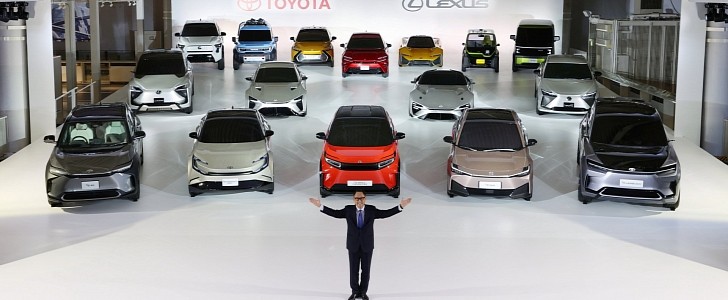Toyota arrived late at the EV table and did everything possible to delay the EV adoption, not only for itself but for the whole market. Jack Hollis, executive vice president of sales at Toyota Motor North America, thinks the electric vehicles will not see mass adoption because consumer demand is not sufficient.
After resisting for years the electrification trend, Toyota surprised everyone at the end of last year by announcing no less than 30 electric vehicles. I, along with others, thought the sleeping giant had finally awakened, but the reality is sometimes more than wishful thinking. Toyota released the bZ4X, its first electric vehicle, and promised unprecedented battery durability. Everyone cheered before things started to unravel.
Soon, customers began complaining that the battery would not accept a fast charge in cold weather. This is a bummer for anyone using its car for anything other than short drives around town. Adding insult to injury, reports started coming in of wheels falling off. This was embarrassing for a carmaker that prides itself on quality and durability. The problem led to a recall while the production was stopped, and Toyota offered to reimburse affected customers.
Toyota not having a single EV in the market at the moment might explain why its executives spare no moment to deride electric vehicles. During a recent webinar hosted by the Detroit-based Automotive Press Association, Jack Hollis mocked the Biden administration’s goals to have battery-electric vehicles reach 50% of the U.S. new vehicle sales by 2030. The reason? Lack of consumer demand.
“I don’t think the market is ready. I don’t think the infrastructure is ready. And even if you were ready to purchase one, and if you could afford it … they’re still too high,” Hollis says, according to Forbes.
Hollis’ opinion is contradicted by reality. Speaking about consumer demand, there’s no electric model available for immediate purchase in the U.S., and the waiting time to get one stretches for months and sometimes more than a year. Tesla, which sells the most EVs in the United States, cannot keep up with the demand despite constantly expanding production. Not even the ever-increasing prices can keep consumers from wanting an electric vehicle.
And it’s not only Tesla. All carmakers have long delivery times for their EVs. Ford had to stop taking orders for the current model year of the F-150 Lightning “due to high demand.” In the meantime, even used electric vehicles have gone up in price. This happens precisely because of the high demand.
It’s possible that the situation for Toyota is different, and the Japanese carmaker faces a “lack of consumer demand.” After all, it is the maker of an EV that loses its wheels and doesn’t charge properly. This might very well be the Kodak moment for Toyota. Not like in the good “say-cheese” way, but in the Nokia way.
Soon, customers began complaining that the battery would not accept a fast charge in cold weather. This is a bummer for anyone using its car for anything other than short drives around town. Adding insult to injury, reports started coming in of wheels falling off. This was embarrassing for a carmaker that prides itself on quality and durability. The problem led to a recall while the production was stopped, and Toyota offered to reimburse affected customers.
Toyota not having a single EV in the market at the moment might explain why its executives spare no moment to deride electric vehicles. During a recent webinar hosted by the Detroit-based Automotive Press Association, Jack Hollis mocked the Biden administration’s goals to have battery-electric vehicles reach 50% of the U.S. new vehicle sales by 2030. The reason? Lack of consumer demand.
“I don’t think the market is ready. I don’t think the infrastructure is ready. And even if you were ready to purchase one, and if you could afford it … they’re still too high,” Hollis says, according to Forbes.
Hollis’ opinion is contradicted by reality. Speaking about consumer demand, there’s no electric model available for immediate purchase in the U.S., and the waiting time to get one stretches for months and sometimes more than a year. Tesla, which sells the most EVs in the United States, cannot keep up with the demand despite constantly expanding production. Not even the ever-increasing prices can keep consumers from wanting an electric vehicle.
And it’s not only Tesla. All carmakers have long delivery times for their EVs. Ford had to stop taking orders for the current model year of the F-150 Lightning “due to high demand.” In the meantime, even used electric vehicles have gone up in price. This happens precisely because of the high demand.
It’s possible that the situation for Toyota is different, and the Japanese carmaker faces a “lack of consumer demand.” After all, it is the maker of an EV that loses its wheels and doesn’t charge properly. This might very well be the Kodak moment for Toyota. Not like in the good “say-cheese” way, but in the Nokia way.









